Daniela Rus
MIT, USA

One Robot for Every Task
ABSTRACT
The digitization of practically everything coupled with advances in machine learning, the automation of knowledge work, and advanced robotics promises a future with democratized use of machines and wide-spread use of AI, robots and customization. While the last 60 years have defined the field of industrial robots, and empowered hard bodied robots to execute complex assembly tasks in constrained industrial settings, the next 60 years could be ushering in our time with Pervasive robots that come in a diversity of forms and materials, helping people with physical and cognitive tasks. However, the pervasive use of machines remains a hard problem. How can we accelerate the creation of machines customized to specific tasks? Where are the gaps that we need to address in order to advance the bodies and brains of machines? How can we develop scalable and trustworthy reasoning engines?
In this talk I will discuss recent developments in machine learning and robotics, focusing on about how computation can play a role in pervasive computation by (1) developing Neural Circuit Policies, an efficient approach to more interpretable machine learning engines, (2) making machines more capable of reasoning in the world, (3) making custom robots, and (4) making more intuitive interfaces between robots and people.
BIO
Daniela Rus is the Andrew (1956) and Erna Viterbi Professor of Electrical Engineering and Computer Science, Director of the Computer Science and Artificial Intelligence Laboratory (CSAIL) at MIT, and Deputy Dean of Research in the Schwarzman College of Computing at MIT. Rus’ research interests are in robotics and artificial intelligence. The key focus of her research is to develop the science and engineering of autonomy. Rus is a MacArthur Fellow, a fellow of ACM, AAAI and IEEE, a member of the National Academy of Engineering, and of the American Academy of Arts and Sciences. She is a senior visiting fellow at MITRE Corporation. She is the recipient of the Engelberger Award for robotics and the IEEE RAS Pioneer award. She earned her PhD in Computer Science from Cornell University.
Schahram Dustdar
Distributed Systems Group, TU Wien, Austria

Engineering the New Fabric of the Distributed Compute Continuum
ABSTRACT
As humans, things, software and AI continue to become the entangled fabric of distributed systems, systems engineers and researchers are facing novel challenges. In this talk, we analyze the role of IoT, Edge, and Cloud, as well as AI in the co-evolution of distributed systems for the new decade. We identify challenges and discuss a roadmap that these new distributed systems have to address. We take a closer look at how a cyber-physical fabric will be complemented by AI operationalization to enable seamless end-to-end distributed systems.
BIO
Schahram Dustdar is Full Professor of Computer Science heading the Research Division of Distributed Systems at the TU Wien, Austria. He holds several honorary positions: University of California (USC) Los Angeles; Monash University in Melbourne, Shanghai University, Macquarie University in Sydney, University Pompeu Fabra, Barcelona, Spain. From Dec 2016 until Jan 2017 he was a Visiting Professor at the University of Sevilla, Spain and from January until June 2017 he was a Visiting Professor at UC Berkeley, USA.
From 1999 – 2007 he worked as the co-founder and chief scientist of Caramba Labs Software AG in Vienna (acquired by Engineering NetWorld AG), a venture capital co-funded software company focused on software for collaborative processes in teams. Caramba Labs was nominated for several (international and national) awards: World Technology Award in the category of Software (2001); Top-Startup companies in Austria (CapGemini Ernst & Young) (2002); MERCUR Innovation award of the Austrian Chamber of Commerce (2002). He is co-founder of edorer.com (USA) and sinoaus.net (based in Nanjing, China), where he is the chief-scientist.
He is founding co-Editor-in-Chief of ACM Transactions on Internet of Things (ACM TIoT) as well as Editor-in-Chief o Computing (Springer). He is an Associate Editor of IEEE Transactions on Services Computing, IEEE Transactions on Cloud Computing, ACM Computing Surveys, ACM Transactions on the Web, and ACM Transactions on Internet Technology, as well as on the editorial board of IEEE Internet Computing and IEEE Computer. Dustdar is recipient of multiple awards: IEEE TCSVC Outstanding Leadership Award (2018), IEEE TCSC Award for Excellence in Scalable Computing (2019), TCI Distinguished Service Award 2021 by the IEEE Technical Committee on the Internet (TCI) (2021), ACM Distinguished Scientist (2009), ACM Distinguished Speaker (2021), IBM Faculty Award (2012). He is an elected member of the Academia Europaea: The Academy oz Europe, where he is chairman of the Informatics Section, as well as an IEEE Fellow (2016) and an Asia-Pacific Artificial Intelligence Association (AAIA) Fellow and president (2021) and member of the Academy of the United Nations Science and Technology Organization (2021).